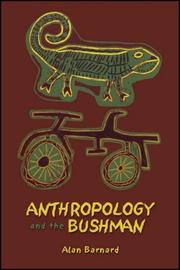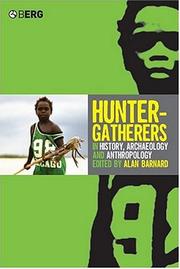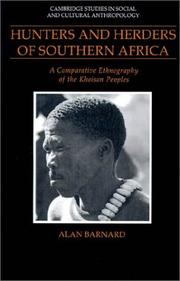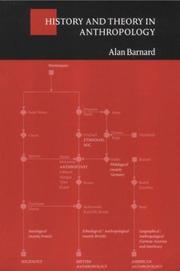| Listing 1 - 10 of 41 | << page >> |
Sort by
|
Multi
ISBN: 9781107041127 9781107692596 9781139644563 1107692598 1107041120 1139644564 1316466981 1316468739 Year: 2016 Publisher: Cambridge: Cambridge university press,
Abstract | Keywords | Export | Availability | Bookmark
 Loading...
Loading...Choose an application
- Reference Manager
- EndNote
- RefWorks (Direct export to RefWorks)
"For ninety per cent of our history, humans have lived as 'hunters and gatherers', and for most of this time, as talking individuals. No direct evidence for the origin and evolution of language exists; we do not even know if early humans had language, either spoken or signed. Taking an anthropological perspective, Alan Barnard acknowledges this difficulty and argues that we can nevertheless infer a great deal about our linguistic past from what is around us in the present. Hunter-gatherers still inhabit much of the world, and in sufficient number to enable us to study the ways in which they speak, the many languages they use, and what they use them for. Barnard investigates the lives of hunter-gatherers by understanding them in their own terms, to create a book which will be welcomed by all those interested in the evolution of language"--
Linguistics --- Ethnology. Cultural anthropology --- Semiotics --- Prehistory --- Language and languages --- Sign language. --- Human evolution. --- Origin --- History. --- Sign language --- Human evolution --- History --- Language and languages - Origin - History --- Historical linguistics. --- Origin.
Multi
ISBN: 9781107025691 9781107651098 9781139198707 9781139518994 1139518992 1280775203 9781280775208 9781139517133 1139517139 1107025699 1107651093 1107232147 1139508385 9786613685599 1139518062 1139515489 113919870X 1139514563 Year: 2012 Publisher: Cambridge Cambridge University Press
Abstract | Keywords | Export | Availability | Bookmark
 Loading...
Loading...Choose an application
- Reference Manager
- EndNote
- RefWorks (Direct export to RefWorks)
Symbolic thought is what makes us human. Claude Lévi-Strauss stated that we can never know the genesis of symbolic thought, but in this powerful new study Alan Barnard argues that we can. Continuing the line of analysis initiated in Social Anthropology and Human Origins (Cambridge University Press, 2011), Genesis of Symbolic Thought applies ideas from social anthropology, old and new, to understand some of the areas also being explored in fields as diverse as archaeology, linguistics, genetics and neuroscience. Barnard aims to answer questions including: when and why did language come into being? What was the earliest religion? And what form did social organization take before humanity dispersed from the African continent? Rejecting the notion of hunter-gatherers as 'primitive', Barnard hails the great sophistication of the complex means of their linguistic and symbolic expression and places the possible origin of symbolic thought at as early as 130,000 years ago.
Linguistics --- Ethnology. Cultural anthropology --- Symbolic anthropology. --- Language and languages --- Human evolution. --- Thought and thinking. --- Origin. --- Symbolic anthropology --- Human evolution --- Thought and thinking --- Origin --- Mind --- Thinking --- Thoughts --- Educational psychology --- Philosophy --- Psychology --- Intellect --- Logic --- Perception --- Psycholinguistics --- Self --- Evolution (Biology) --- Physical anthropology --- Evolutionary psychology --- Human beings --- Origin of languages --- Speech --- Symbolism in anthropology --- Anthropology --- Social Sciences --- Language and languages - Origin

ISBN: 9781845204280 184520428X 9781845204297 1845204298 9786612473616 1474214150 1282473611 1847883303 1003084591 1000183483 9781003084594 9781000183481 9781000186994 1000186997 9781000190113 1000190110 9781847883308 Year: 2007 Publisher: Oxford ; New York : Berg,
Abstract | Keywords | Export | Availability | Bookmark
 Loading...
Loading...Choose an application
- Reference Manager
- EndNote
- RefWorks (Direct export to RefWorks)
The Bushman' is a perennial but changing image. The transformation of that image is important. It symbolizes the perception of Bushman or San society, of the ideas and values of ethnographers who have worked with Bushman peoples, and those of other anthropologists who use this work. Anthropology and the Bushman covers early travellers and settlers, classic nineteenth and twentieth-century ethnographers, North American and Japanese ecological traditions, the approaches of African ethnographers, and recent work on advocacy and social development. It reveals the impact of Bushman studies on anthropology and on the public. The book highlights how Bushman or San ethnography has contributed to anthropological controversy, for example in the debates on the degree of incorporation of San society within the wider political economy, and on the validity of the case for 'indigenous rights' as a special kind of human rights. Examining the changing image of the Bushman, Barnard provides a new contribution to an established anthropology debate.
Anthropology in popular culture --- Ethnology --- San (African people) --- Popular culture --- Cultural anthropology --- Ethnography --- Races of man --- Social anthropology --- Anthropology --- Human beings --- Basarwa (African people) --- Bushmen --- Bushmen (African people) --- /Xam (African people) --- Khoisan (African people) --- Fieldwork --- Social life and customs. --- Kalahari Desert --- San (Peuple d'Afrique) --- Anthropologie sociale et culturelle --- Anthropologie dans la culture populaire --- Moeurs et coutumes --- Recherche sur le terrain --- Kalahari, Désert du --- San (African people) - Kalahari Desert - Social life and customs --- Ethnology - Fieldwork - Kalahari Desert --- Anthropology in popular culture - Kalahari Desert --- Kalahari Desert - Social life and customs

ISBN: 1859738257 1859738206 9781859738252 Year: 2004 Publisher: Oxford Berg
Abstract | Keywords | Export | Availability | Bookmark
 Loading...
Loading...Choose an application
- Reference Manager
- EndNote
- RefWorks (Direct export to RefWorks)
Hunting and gathering societies. --- Chasseurs-cueilleurs --- Geografie --- Sociale geografie --- Maatschappij. --- Hunting and gathering societies --- Food gathering societies --- Gathering and hunting societies --- Hunter-gatherers --- Hunting, Primitive --- Ethnology --- Subsistence hunting

ISBN: 0521411882 0521428653 1139166506 9780521428651 9780521411882 Year: 1992 Volume: 85 Publisher: Cambridge : Cambridge University Press,
Abstract | Keywords | Export | Availability | Bookmark
 Loading...
Loading...Choose an application
- Reference Manager
- EndNote
- RefWorks (Direct export to RefWorks)
The Khoisan are a cluster of southern African peoples, including the famous Bushmen or San 'hunters', the Khoekhoe 'herders' (in the past called 'Hottentots'), and the Damara, also a herding people. Most Khoisan live in the Kalahari desert and surrounding areas of Botswana and Namibia. In spite of differences in their way of life, the various groups have much in common, and this book explores these similarities and the influence of environment and history on aspects of Khoisan culture. This is the first book on the Khoisan as a whole since the publication in 1930 of The Khoisan Peoples of South Africa, by Isaac Schapera, doyen of southern African studies.
Bushmen (African tribe) --- Khoikhoi (African people) --- Khoikhoi (Afrikaans volk) --- Khoikhoi (Peuple africain) --- San (African people) --- San (Afrikaans volk) --- San (Peuple africain) --- Khoikhoi (peuple d'Afrique) --- San (Peuple d'Afrique) --- Khoisan (African people) --- Khoisan (African people). --- Khoi-San (African people) --- Ethnology --- Social Sciences --- Anthropology --- Basarwa (African people) --- Bushmen --- Bushmen (African people) --- /Xam (African people) --- Hottentot (African people) --- Hottentots --- Khoe (Khoikhoi people) --- Khoi (African people) --- Khoikhoin (African people)

ISBN: 0521774322 0521773334 9780521773331 9780521774321 Year: 2000 Publisher: Cambridge Cambridge University Press
Abstract | Keywords | Export | Availability | Bookmark
 Loading...
Loading...Choose an application
- Reference Manager
- EndNote
- RefWorks (Direct export to RefWorks)
#SBIB:39A3 --- #SBIB:39A1 --- Antropologie: geschiedenis, theorie, wetenschap (incl. grondleggers van de antropologie als wetenschap) --- Antropologie: algemeen --- Ethnology. Cultural anthropology --- Anthropology --- Philosophy --- History --- History. --- Philosophy. --- Anthropology - Philosophy --- Anthropology - History --- Anthropologie --- Histoire --- Philosophie
Book
ISBN: 1108406874 9781108406871 9781108289603 9781108418263 Year: 2019 Publisher: Cambridge Cambridge University Press
Abstract | Keywords | Export | Availability | Bookmark
 Loading...
Loading...Choose an application
- Reference Manager
- EndNote
- RefWorks (Direct export to RefWorks)
The hunter-gatherers of southern Africa known as 'Bushmen' or 'San' are not one single ethnic group, but several. They speak a diverse variety of languages, and have many different settlement patterns, kinship systems and economic practices. The fact that we think of them as a unity is not as strange as it may seem, for they share a common origin: they are an original hunter-gatherer population of southern Africa with a history of many thousands of years on the subcontinent. Drawing on his four decades of field research in Botswana, Namibia and South Africa, Alan Barnard provides a detailed account of Bushmen or San, covering ethnography, archaeology, folklore, religious studies and rock-art studies as well as several other fields. Its wide coverage includes social development and politics, both historically and in the present day, helping us to reconstruct both human prehistory and a better understanding of ourselves.
Ethnologie. --- Ethnology --- Ethnology. --- Religionsausübung. --- San (African people). --- San --- Sozialanthropologie. --- Sozioökonomischer Wandel. --- Verwandtschaft. --- Vor- und Frühgeschichte. --- Wildbeuter. --- Kalahari. --- Southern Africa. --- Südafrika
Book
ISBN: 9780521765312 0521765315 9780521749299 0521749298 9780511974502 9781139077408 1139077406 9781139081962 1139081969 0511974507 9781139079693 1139079697 9781139079693 1107217393 1139062948 1283110865 9786613110862 1139075144 1139069373 Year: 2011 Publisher: Cambridge, UK ; New York : Cambridge University Press,
Abstract | Keywords | Export | Availability | Bookmark
 Loading...
Loading...Choose an application
- Reference Manager
- EndNote
- RefWorks (Direct export to RefWorks)
"The study of human origins is one of the most fascinating branches of anthropology. Yet it has rarely been considered by social or cultural anthropologists, who represent the largest subfield of the discipline. In this powerful study Alan Barnard aims to bridge this gap. Barnard argues that social anthropological theory has much to contribute to our understanding of human evolution, including changes in technology, subsistence and exchange, family and kinship, as well as to the study of language, art, ritual and belief. This book places social anthropology in the context of a widely-conceived constellation of anthropological sciences. It incorporates recent findings in many fields, including primate studies, archaeology, linguistics and human genetics. In clear, accessible style Barnard addresses the fundamental questions surrounding the evolution of human society and the prehistory of culture, suggesting a new direction for social anthropology that will open up debate across the discipline as a whole"--
Human beings --- Human evolution. --- Origin. --- Evolution (Biology) --- Physical anthropology --- Evolutionary psychology --- Antiquity of human beings --- Origin of human beings --- Human evolution --- Origin --- Social Sciences --- Anthropology
Book
ISBN: 1108289606 1108307558 1108304559 1108418260 Year: 2019 Publisher: Cambridge : Cambridge University Press,
Abstract | Keywords | Export | Availability | Bookmark
 Loading...
Loading...Choose an application
- Reference Manager
- EndNote
- RefWorks (Direct export to RefWorks)
The hunter-gatherers of southern Africa known as 'Bushmen' or 'San' are not one single ethnic group, but several. They speak a diverse variety of languages, and have many different settlement patterns, kinship systems and economic practices. The fact that we think of them as a unity is not as strange as it may seem, for they share a common origin: they are an original hunter-gatherer population of southern Africa with a history of many thousands of years on the subcontinent. Drawing on his four decades of field research in Botswana, Namibia and South Africa, Alan Barnard provides a detailed account of Bushmen or San, covering ethnography, archaeology, folklore, religious studies and rock-art studies as well as several other fields. Its wide coverage includes social development and politics, both historically and in the present day, helping us to reconstruct both human prehistory and a better understanding of ourselves.
San (African people) --- Ethnology --- Basarwa (African people) --- Bushmen --- Bushmen (African people) --- /Xam (African people) --- Khoisan (African people)
Book
ISBN: 1108936628 1108837956 1108944124 1108950353 Year: 2022 Publisher: Cambridge : Cambridge University Press,
Abstract | Keywords | Export | Availability | Bookmark
 Loading...
Loading...Choose an application
- Reference Manager
- EndNote
- RefWorks (Direct export to RefWorks)
In the past twenty years, there have been exciting new developments in the field of anthropology. This second edition of Barnard's classic textbook on the history and theory of anthropology has been revised and expanded to include up-to-date coverage on all the most important topics in the field. Its coverage ranges from traditional topics like the beginnings of the subject, evolutionism, functionalism, structuralism, and Marxism, to ideas about globalization, post-colonialism, and notions of 'race' and of being 'indigenous'. There are several new chapters, along with an extensive glossary, index, dates of birth and death, and award-winning diagrams. Although anthropology is often dominated by trends in Europe and North America, this edition makes plain the contributions of trendsetters in the rest of the world too. With its comprehensive yet clear coverage of concepts, this is essential reading for a new generation of anthropology students.
Anthropology --- Philosophy. --- History.
| Listing 1 - 10 of 41 | << page >> |
Sort by
|

 Search
Search Feedback
Feedback About UniCat
About UniCat  Help
Help News
News